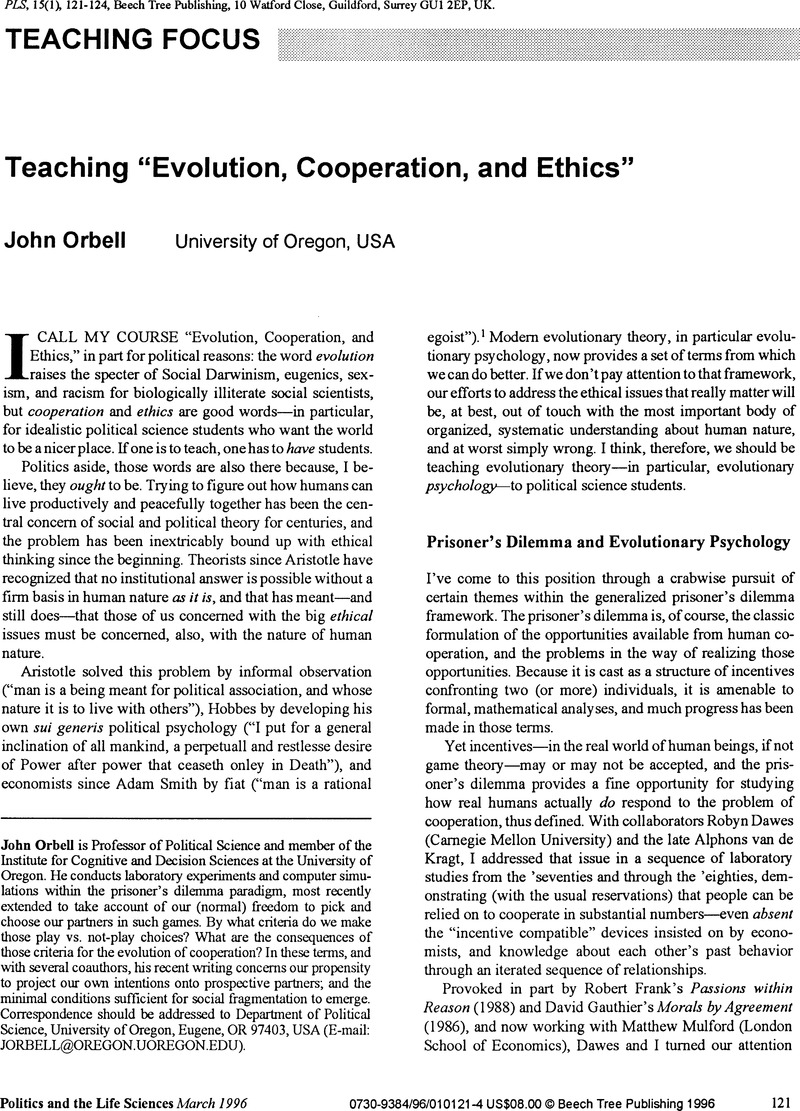No CrossRef data available.
Article contents
Teaching “Evolution, Cooperation, and Ethics”
Published online by Cambridge University Press: 17 May 2016
Abstract
An abstract is not available for this content so a preview has been provided. Please use the Get access link above for information on how to access this content.

- Type
- Teaching Focus
- Information
- Copyright
- Copyright © Association for Politics and the Life Sciences
References
Cosmides, L. (1989). “The Logic of Social Exchange: Has Natural Selection Shaped How Humans Reason?” Cognition 31:169–93.Google Scholar
Frank, R. (1988). Passions within Reason: The Strategic Role of the Emotions. New York: Norton.Google Scholar
Goody, E.N. (1995). “Social Intelligence and Prayer as Dialogue.” In Goody, E.N. (ed.), Social Intelligence and Interaction: Expressions and Implications of the Social Bias in Human Intelligence. New York: Cambridge University Press.Google Scholar
Humphrey, N.K. (1976). “The Social Function of Intellect.” In Bateson, P.P.G. and Hinde, R.A. (eds.), Growing Points in Ethology. New York: Cambridge University Press.Google Scholar
Levinson, S.C. (1995). “Interactional Biases in Human Thinking.” In Goody, E.N. (ed.), Social Intelligence and Interaction: Expressions and Implications of the Social Bias in Human Intelligence. New York: Cambridge University Press.Google Scholar
Morikawa, T., Orbell, J., and Runde, A. (1995). “The Advantage of Being Moderately Cooperative.” American Political Science Review 89:601–11.Google Scholar
Orbell, J. and Dawes, R. (1993). “Social Welfare, Cooperators' Advantage and the Option of Not Playing the Game.” American Sociological Review 58:787–800.Google Scholar
Orbell, J., Dawes, R., and Schwartz-Shea, P. (1994). “Trust, Social Categories, and Individuals: The Case of Gender.” Motivation and Emotion 18:109–28.Google Scholar
Orbell, J., Runde, A., and Morikawa, T.(forthcoming). “The Robustness of Cognitively Simple Judgment in Ecologies of Prisoner's Dilemma Games.” BioSystems.Google Scholar
Orbell, J., Zeng, L., and Mulford, M.(forthcoming). “Individual Experience and the Fragmentation of Societies.” American Sociological Review.Google Scholar
Simon, H. (1990). “A Mechanism for Social Selection and Successful Altruism.” Science 250:1665–68.Google Scholar
Tooby, J. and Cosmides, L. (1992). “The Psychological Foundations of Culture.” In Barkow, J., Cosmides, L., and Tooby, J. (eds.), The Adapted Mind. New York: Oxford University Press.Google Scholar
Trivers, R. (1971). “The Evolution of Reciprocal Altruism.” Quarterly Review of Biology 46:35–57.Google Scholar




